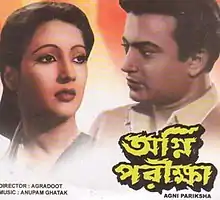Agni Pariksha (1954 film)
Agni Pariksha (alternatively Agni Pareeksha or Agni Pariksha or Agnipariksha, transl. The Test Of Fire) is a 1954 Indian Bengali-language romantic drama film directed by Agradoot[lower-alpha 1] and starring Uttam Kumar and Suchitra Sen. The film was adapted from Asha Purna Devi's novel of the same name.[2] The film become overwhelming success from both critically and commercially. The movie was remade in Hindi in 1967 as Chhoti Si Mulaqat also starring Uttam Kumar.[3] Before that the movie was simultaneously made into a 1959 Telugu - Tamil bilingual titled Mangalya Balam in Telugu and Manjal Mahimai in Tamil.[2]
| Agni Pariksha | |
|---|---|
 DVD cover of Agni Pariksha | |
| Directed by | Agradoot[lower-alpha 1] |
| Written by | Ashapoorna Devi |
| Screenplay by | Nitai Bhattachariya |
| Based on | Agni Pariksha by Asha Purna Devi |
| Produced by | Tarak Pal |
| Starring | Uttam Kumar Suchitra Sen |
| Cinematography | Bibhuti Laha Bijoy Ghosh |
| Edited by | Santosh Ganguly |
| Music by | Anupam Ghatak |
Production company | M. P. Productions |
| Distributed by | D Looks Films Distributors Limited |
Release date | 3 September 1954 |
Running time | 120 min |
| Country | India |
| Language | Bengali |
Plot
The story revolves around Tapasi, a singer who has been married forcefully as a child to an old village zamindar's grandson Bulu. Back at home, her parents discovers the truth and vows to wipe out every single memory of Tapasi ever being married. Years later, Tapasi has now grown up to be a lovely young lady and is in love with Kiriti. She introduces Kiriti to her mother, who approves of him, and plans to marry them. Things change when Tapasi finds out that she has already been married in her childhood. This creates a conflict in her. As others find out this secret and ostracize Tapasi. How will Tapasi and Kiriti deal with this stigma? Will they triumph in their love?
Cast
- Uttam Kumar as Kiriti Mukherjee
- Suchitra Sen as Tapasi Banerjee
- Anup Kumar
- Jahar Ganguly
- Jahor Roy
- Kamal Mitra
- Panchanan Bhattacharya
- Bibhu Bhattacharya
- Shikharani Bag
- Shyamali Chakraborty
- Suprabha Mukhopadhyay
- Aparna Debi
- Jamuna Singha
- Sabita Bhattacharya
Soundtrack
| Agni Pariksha | |
|---|---|
| Soundtrack album by | |
| Released | 1954 |
| Recorded | 1954 |
| Studio | MP Production |
| Genre | Feature Film Soundtrack |
| Length | 0:17:10 |
| Label | Angel Digital Pvt Ltd |
| Producer | Tarak Pal |
| No. | Title | Playback | Length |
|---|---|---|---|
| 1. | "Aaj Achhi Kal Nei" | Alpana Banerjee | 3:02 |
| 2. | "Gane Mor Kon Indradhanu" | Sandhya Mukherjee | 3:07 |
| 3. | "Jodi Bhul Korei" | Sandhya Mukherjee | 2:22 |
| 4. | "Jibon Nodir Jowar Bhata" | Satinath Mukherjee | 3:00 |
| 5. | "Ke Tumi Amare Dako" | Sandhya Mukherjee | 3:16 |
| 6. | "Phuler Kane Bhramar" | Sandhya Mukherjee | 2:23 |
| Total length: | 17:10 | ||
Reception
The film became a trend setter for Bengali cinema. The film was a breakthrough for both Uttam Kumar and Suchitra Sen. Their pair was hugely liked by the people. After the film Uttam Kumar ruled the Bengali cinema until his death.[5]
The film created a record at the box office and became an all time blockbuster and ran for 126 days in theatres. It collected over five times its budget. It became the highest grossing Bengali film of 1954.[6]
Controversy
To see the poster of Agnipariksha Uttam's wife Gauri Devi and Suchitra's husband Divanath both thoughts there have been a real love affairs between Uttam and Suchitra. In the poster there is written Agnipariksha : Amader Pronoyer Sakshi to see this Dibanath and Gauri become so angry on Uttam and Suchitra so there had been huge problems between all of them.[7]
Remakes
The film was remade in Telugu and Tamil in 1959 as Mangalya Balam and Manjal Mahimai respectively, starring Savitri and the famous Telugu star ANR. That film was one National Film Award in 7th National Film Award. The film was remade in Hindi as Chhoti Si Mulaqat with Uttam Kumar producing and reprising his role[2][3] and Vyjaianthimala in Suchitra Sen role.
Notes
- The pen name of a group of Indian film technicians in Bengali cinema signing collectively as director.[1]
References
- Yves Thoraval (1 February 2000). The Cinemas of India. Macmillan India. p. 237. ISBN 978-0-333-93410-4.
- Narasimham, M. L. (8 October 2015). "Mangalyabalam (1959)". The Hindu.
- "Remakes of Bengali films: What's new in this trend? - Times of India". The Times of India.
- "Songs Download, Bengali MP3 Songs, Raaga.com Bengali Songs - Raaga.com - A World Of Music".
- Chowdhury, Sayandeb. "A postcolonial iconi-city: Re-reading Uttam Kumar's cinema as metropolar melodrama". South Asian History and Culture.
- "উত্তম নেই উত্তম আছেন". aajkaal.in (in Bengali). Retrieved 16 January 2023.
- TheWallAdmin (6 June 2021). "'অগ্নিপরীক্ষা'র পোস্টার-বিতর্কে নাকি ঘি ঢেলেছিলেন গৌরী-দিবানাথ, উত্তমের জীবনে এমন কত যে গল্প | TheWall". Retrieved 12 November 2022.